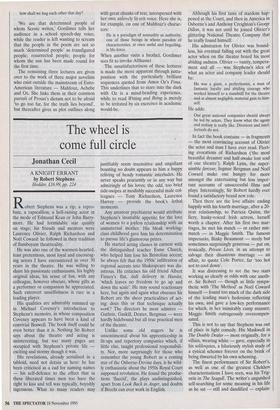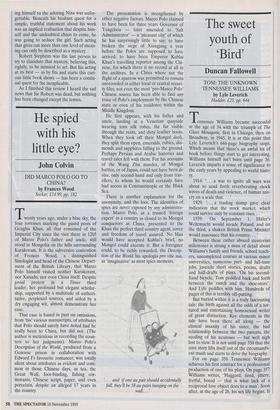The wheel is come full circle
Jonathan Cecil
A KNIGHT ERRANT by Robert Stephens Hodder, £16.99, pp. 224 Robert Stephens was a rip, a repro- bate, a rapscallion; a hell-raising actor in the mode of Edmund Kean or John Barry- more. He had formidable star quality on stage; his friends and mentors were Laurence Olivier, Ralph Richardson and Noel Coward: he followed in their tradition of flamboyant theatricality.
He was also one of the warmest-hearted, least pretentious, most loyal and encourag- ing actors I have encountered in over 30 years in the theatre. He was willing to share his passionate enthusiasms, his highly original ideas, his sense of fun, with any colleague, however obscure, whose gifts as a performer or companion he appreciated. Such extrovert unselfishness is rare in a leading player.
His qualities are admirably summed up in Michael Coveney's introduction to Stephens's memoirs, in whose composition Coveney appears to have been a kind of convivial Boswell. The book itself could be even better than it is. Nothing Sir Robert says about the theatre and acting is uninteresting, but too many pages are occupied with Stephens's private life exciting and stormy though it was.
His revelations, already serialised in a tabloid, need not detain us here: he has been criticised as a cad for naming names — his self-defence to the effect that in these liberated times men too have the right to kiss and tell was typically, boyishly ingenuous. What to many readers may justifiably seem insensitive and ungallant boasting no doubt appears to him a happy reliving of heady romantic interludes. He never speaks pruriently or in any way but admiringly of his loves; the odd, too brief side-swipes at modishly successful male col- leagues — Tony Richardson, Laurence Harvey — provide the book's lethal moments.
Any amateur psychiatrist would attribute Stephens's insatiable appetite for the love of women to a joyless relationship with an unmatemal mother. His bleak working- class childhood gave him his determination to pursue life's glamorous prizes.
He started acting classes in earnest with the distinguished teacher Esme Church, who helped him lose his Bristolian accent; he always felt that the 1950s' infiltration of regional accents into Shakespeare was dis- astrous. He criticises his old friend Albert Finney's flat, dull delivery in Hamlet, `which leaves no freedom to go up and down the scale'. He may sound reactionary here, but again and again what obsesses Sir Robert are the sheer practicalities of act- ing: does this or that technique actually work? The directors he most admires Guthrie, Gaskill, Dexter, Bergman — were hardly hidebound but all true practical men of the theatre.
Unlike some old stagers he is unsentimental about his apprenticeship in fit-ups and repertory companies which, if little else, taught professional responsibili- ty. Nor, more surprisingly for those who remember the young Robert as a coming star of the Osborne-Devine days, is he wild- ly enthusiastic about the 1950s Royal Court supposed revolution. He found the produc- tions 'flaccid', the plays undistinguished, apart from Look Back in Anger, and doubts if Brecht can ever work in English. Although his first taste of stardom hap- pened at the Court, and then in America in Osbome's and Anthony Creighton's George Dillon, it was not until he joined Olivier's glittering National Theatre Company that he really found himself.
His admiration for Olivier was bound- less, his eventual falling out with the great actor when on the theatre board his most abiding sadness. Olivier — vanity, tempera- ment and all — was Stephens's idea of what an actor and company leader should be:
He was a giant, a perfectionist, a man of fantastic loyalty and abiding courage who worked himself to a standstill for the theatre and at almost negligible material gain to him- self.
He adds: Our great national companies should always be led by actors. They know what the agony and ecstasy is really like. Directors and intel- lectuals do not.
In fact the book contains — in fragments — the most convincing account of Olivier the actor and man I have ever read. Fleet- ing evocations of Richardson (`the most beautiful dreamer and half-awake lost soul of our theatre'), Ralph Lynn, the super- nimble farceur, Ingmar Bergman and Noel Coward make one hungry for more amongst the entertaining but less impor- tant accounts of unsuccessful films and plays. Interestingly, Sir Robert hardly ever found a satisfactory brand new role.
Then there are the love affairs: ending happily with his fourth marriage, after a 20- year relationship, to Patricia Quinn, the fiery, husky-voiced Irish actress, herself worth a chapter. After his first two mar- riages, he met his match — or rather mis- match — in Maggie Smith. The famous impresario, Binky Beaumont — steely but sometimes surprisingly generous — put on, ironically, Private Lives, in an attempt to salvage their disastrous marriage — an affair, to quote Cole Porter, far 'too hot not to cool down'.
It was distressing to see the two stars working so clearly at odds with one anoth- er. Sir Robert — though as little sympa- thetic with 'The Method' as Noel Coward himself — found too much of the dark side of the leading man's hedonism reflecting his own, and gave a low-key performance for which, in her inimitably camp manner, Maggie Smith outrageously overcompen- sated.
This is not to say that Stephens was out of place in light comedy. His Maskwell in The Double Dealer — most originally, for a villain, wearing white — gave, especially in his soliloquies, a hilariously stylish study of a cynical schemer forever on the brink of being thwarted by his own scheming.
The finest performance of Sir Robert's, as well as one of the greatest Chekhov characterisations I have seen, was his Trig- orin in The Seagull. The writer's anguished self-searching for some meaning in his life as he sat — still and dandified — explain- ing himself to the adoring Nina was unfor- gettable. Beneath his hesitant quest for a simple, truthful statement about his work was an implied realisation that despite him- self and the undoubted chaos to come, he was going to seduce the girl. Such acting that gives out more than one level of mean- ing can only be described as a mystery.
Robert Stephens was the last person to try to elucidate that mystery, believing this, rightly, to be inimical to art. But his acting at its best — as by fits and starts this curi- ous little book shows — has been a contin- ual quest for the inexplicable.
As I finished this review I heard the sad news that Sir Robert was dead, but nothing has been changed except the tenses.



















































































 Previous page
Previous page